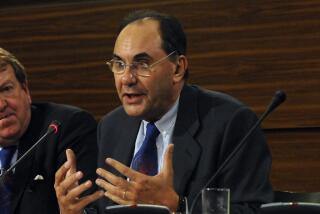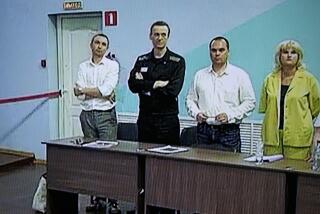Cuba Said to Seize Human Rights Critics
- Share via
MIAMI — Three leading human rights activists who outspokenly criticized the regime of Cuban President Fidel Castro were arrested in pre-dawn raids on their homes in Havana on Sunday, according to a representative of Cuban rights organizations here.
The three, Elizardo Sanchez, Hubert Jerez and Hiram Abi Cobas were picked up only days after they complained to visiting American journalists of an intensified crackdown against dissidents by the Castro government.
According to Ramon Cernuda, the Miami representative of the Havana human rights groups who had been in touch with Havana by telephone, security police raided the homes of the three men at 5 a.m., seizing papers and books. Cernuda said the security police who seized Sanchez, head of the Cuban Commission of Human Rights and National Conciliation, also took an enlarged photo of the rights leader with Sen. Edward M. Kennedy (D-Mass.) taken during a trip to the United States last year.
Jerez heads the year-old Jose Marti Human Rights organization and Abi Cobas is acting head of the Human Rights Party, founded a year ago by members of another activist group, the Cuban Human Rights Committee.
Meeting With Journalists
Cernuda said no reason for the arrests was given, but it was believed that the government action stemmed from remarks the three men made in their meeting with the foreign journalists 10 days ago.
For two years, Sanchez and other activists had been allowed limited freedom in contacting foreign diplomats and journalists to complain of rights abuses by the Castro regime which, since late 1987, had been attempting to polish its human rights image. The regime even permitted Sanchez to visit the United States for a few weeks last year.
But official tolerance of the dissidents has waned this year, particularly during the April visit to Cuba by Soviet President Mikhail S. Gorbachev, when Sanchez said that more than 60 activists were detained. Sanchez was briefly detained by security police in mid-April, and he was denied permission to make another long-planned trip to the United States in June.
During his meeting with American reporters 10 days ago, Sanchez and the two other rights leaders characterized the executions of four Cuban officials convicted of drug trafficking last month as “assassinations” and reported that the rights of the doomed men’s families to claim their bodies had been violated when they were buried secretly.
Sanchez also complained that the Castro regime was showing increasing contempt for human rights and had begun an intensified campaign against the country’s rights organizations, which are technically illegal under Communist Cuba’s laws.
In another development, Cuba’s official news agency said Sunday that the longtime financial director in the Interior Ministry had killed himself, having expressed “shame” over his colleagues’ involvement in drug trafficking.
Cuban Official’s Suicide
“Victim of a severe state of depression, Col. Rafael Alvarez Cueto, who worked for years as chief of the finance bureau of Interior Ministry, took his life,” Prensa Latina said in a dispatch monitored in Mexico City.
Alvarez left two letters to friends and family expressing his “dejection and shame” over revelations that some Interior Ministry officials engaged in the trafficking of narcotics to the United States, Prensa Latina said.
Cuban authorities have been reorganizing the Interior Ministry and other agencies since June 12, when the government publicly acknowledged the involvement of some officials in the trafficking of cocaine and marijuana.
More to Read
Sign up for Essential California
The most important California stories and recommendations in your inbox every morning.
You may occasionally receive promotional content from the Los Angeles Times.










